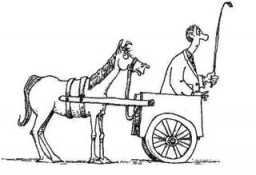A client walked into my office recently saying that she needed a new career because her current one was making her sick; so sick, in fact, that she could not hold back the tears.
In this case, as in so many others, she got stuck in a toxic work environment with an abusive boss and/or co-workers.
Often a bad situation is made worse by a number of stressful factors, such as unreasonable workloads; or the prospect of an impending layoff due to a change in the economy; or the expectation that they be available 24/7; or a change of job conditions from flex-time at home to face-time in the office; or the fear of being squeezed out of competitive due to lack of educational credentials; or the unspoken pressure from family to maintain a high income at any price.
Whatever the circumstances, my client feels an overwhelming need to get out of her current job. Her short term goal is to avoid the pain. The long term goal is to find a better jobfit…if she only knew what it was! In the meantime, her priority is to maintain or improve her compensation package.
So, in fact, there are two contradictory goals at work here: my client wants a new job that will giver her more vitality and joy, but she also wants to avoid financial insecurity.
In order to avoid a future that might be financially insecure, she can’t take action to move out of her current job field because she doesn’t know what else to do; therefore, to move now means she might end up financially insecure. Damned if she does take action, damned if she doesn’t–this is the essence of being stuck.
She is likely to remain stuck for as long as she seeks a long term solution to a short term problem. What do I mean by that?
A career transition is not the solution to a short term problem. A transition takes time. It is best undertook during a period of stability without overwhelming financial or psychological pressures. A transition is oriented around creating the kind of life you want; it is not oriented around problem solving.
In order to solve her current problem, my client is learning to separate her contradictory goals. Her toxic work environment is a short term problem requiring a short term solution.
As distasteful as it is for her, she realizes that her best chance of getting out of her toxic environment, while maintaining her current pay check, is to do the same thing for another org; or, cross the street, and purchase the services (that she is now selling) for large orgs. Or, she can repackage her skills and market them for a related but different job target.
Sure, her current job is something she no longer wants to do. But she is not stuck there forever (it just feels like that right now). Feelings come and go: sometimes we are in love, sometimes not.
Most of us get angry, fearful, joyful, anxious, happy, sad, and so on, at different times in different circumstances. Why should feelings govern our commitment to taking actions to achieve our goals?
Some days I don’t feel like writing, or seeing my clients, or cooking dinner but I do them anyways, not because I have to but because these actions help me create what really matters to me. Feelings are temporary.
My client has dried her tears and realizes that the first thing she needs to do is take care of herself by getting out of her toxic environment. She needs to get into another job for the SHORT term in order to build up the capacity to make a transition over the LONG term.
Making progress towards a long term goal is about building the life you want. My client now understands that her long term goal to have a career that fits her deepest values and top priorities is possible but takes time and energy, two things that are in short supply when she is in crisis.
First, get out of the crisis, then take the time to transition.
Like the song says, ‘Dry your eyes and take your song out, it’s a newborn afternoon.’
Dry Your Eyes, Neil Diamond & The Band
(From my all time favorite concert movie The Last Waltz)





 Do you think about changing jobs? The power to do so is right under your nose…well, behind your nose actually! Stored in your brain are memories about events and activities you truly enjoyed in life since childhood. Here are some tips for analyzing your life history for key success factors that reveal work that is personally and financially rewarding.
Do you think about changing jobs? The power to do so is right under your nose…well, behind your nose actually! Stored in your brain are memories about events and activities you truly enjoyed in life since childhood. Here are some tips for analyzing your life history for key success factors that reveal work that is personally and financially rewarding.

